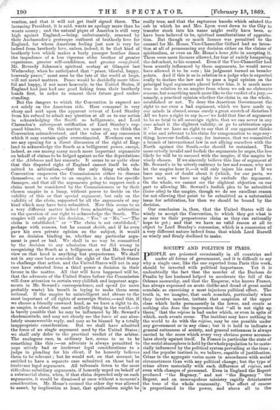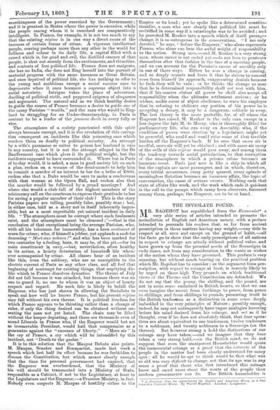SOCIETY AND POLITICS IN rARIS.
PEOPLE are poisoned occasionally in all countries and under all forms of government, and it is difficult to say why a single case, like the one reported from Paris this week, should be invested with political importance. Yet it is undoubtedly the fact that the murder of the Duchess de Praslin by her husband helped to accelerate the fall of the Orleans monarchy, and that the Emperor, who knows France, has always expressed an acute dislike and dread of great social scandals, as exercising a moat injurious political effect. The truth is, we imagine, that such scandals, particularly when they involve murder, irritate that suspicion of the upper class which lurks permanently in the lower, and create as nothing else does the impression that "all is not right up there," that the re'gime is bad under which, or even in spite of which, such events occur. The incident may have nothing in the world to do with the regime, may be one possible under any government or in any class ; but it is held to indicate a, general rottenness of society, and general rottenness is alwayscarried to the score which every very obvious power accumulates slowly against itself. In France in particular the state of the social atmosphere is held by the wholepopulation to be materially influenced by the political system prevailing at the time ;. and the popular instinct is, we believe, capable of justification.. Crime in the aggregate varies more in accordance with social circumstances than with any political change; but the type of crime alters materially with each difference of re'gime, and even with changes of personnel. Even in England the Regent produced "the Regency," and not "the Regency" the Regent, and an unscrupulous ministry rapidly deteriorates the tone of the whole community. The effect of course is proportioned to the power, and above all to the searchingness of the power exercised by the Government ; and it is greatest in States where the power is excessive, while the people among whom it is exercised are comparatively intelligent. In France, for example, it is not too much to say that the existing re'ginte is in one way a direct cause of the increase of certain forms of crime. A vigorous intellectual people, craving perhaps more than any other in the world for fullness and colour in its daily life, a capital filled with a crowd which is, for good and evil, the distilled essence of that people, is shut out sternly from the excitements, and vivacities, and contests of free political life. France does not emigrate, she has no India, she does not fling herself into the pursuit of material progress with the same keenness as Great Britain, and once deprived of political life, she has nothing to offer to the young and ambitious except a social success sure to degenerate when it once becomes a supreme object into a social notoriety. Intrigue takes the place of adventure, duelling of political strife, and peppered epigram of eloquence and argument. The natural and as we think healthy desire to guide the course of France becomes a desire to guide one of the many Parisian "worlds," and the man who would in England be struggling for an Under-Secretaryship, in Paris is content to be a leader of the jeunesse doree in every folly or vice.
The atmosphere of a society penetrated with this spirit always becomes corrupt, and it is the revelation of this corruption consequent on incidents like this poisoning case which renders them so deadly to political security. °An attempt by a wife's paramour or suitor to poison her husband is rare in any country, but it is not the attempt alleged in the De Bauffremont case which gives it its political weight, but the incidents supposed to have surrounded it. Where but in Paris of to-day would, it is asked, a man in good society hit on such a plan, reckon on a woman of the demi-monde to help him to commit a murder of no interest to her for a bribe of £800, reckon also that a Duke would be sure to make a rendezvous with that woman at the Opera Ball, and reckon also that the murder would be followed by a grand marriage ? And where else would a club full of the highest members of the aristocracy call on the courtesan to express their gratitude to her for saving a popular member of their club ? This is the story Parisian papers are telling, possibly false, possibly true ; but, in either case, told as a story not in itself inherently impossible, but as a most regrettable yet natural incident in daily life. "The atmosphere must be corrupt where such foulnesses exist, and the atmosphere must be cleansed ;"—that is the conclusion of that exceptional being the average Parisian, who, with all his tolerance for immorality, has a keen sentiment of scorn for crime; who, if himself a jobber, yet applauds a mob for decreeing "Mort aux voleurs !" and who has been marked for two centuries by a feeling, born, it may be, of the pit,—for its main constituent is envy,—but, nevertheless, often healthy in its action, a hearty detestation of luxuriou's life whenever accompanied by crime. All classes hear of an incident like this, even the soldiery, who are as susceptible to the electric current of Paris as any other class, and all feel that beginning of contempt for existing things, that unpitying dislike which in France dissolves dynasties. The throne of July did not fall because it was attacked, but because there was no one to guard it, no one to whom it was an object of hearty respect and regard. No such fate is likely to befall the Emperor, who has just shown in allowing the Socialists to speak out how well he knows France, but his present re'yinte may fall without his own throne. It is political freedom for which France appears to be thirsting rather than a change of ruler, if only the thing desired can be obtained without unseating the man not yet hated. The chain may be lifted without the keeper departing, and there are thousands even of sound Liberals in France who, if the Emperor would but act as irremovable President, would hail that compromise as a guarantee against the "excesses of liberty." "More air" is the cry of France, a cry which will be intensified by this incident, not "Death to the gaoler."
It is to this solution that the Maupas Debate also points. M. Maupas, Senator and Bonapartist, made last week a speech which lost half its effect because he was forbidden to discuss the Constitution, but which meant clearly enough that the time for personal government had expired, that the Emperor was overburdened, that the Ministry of his will should be transmuted into a Ministry of State, responsible as a Cabinet, if not to the Legislature, at least to the Legislature and the Emperor,—a Prussian Ministry, in fact. Nobody even suspects M. Mat:pas of hostility either to the
Empire or its head ; yet he spoke like a determined constitutionalist, a man who saw clearly that political life must be revivified in some way if a catastrophe was to be avoided ; and he provoked M. Rouher into a speech which of itself presages change, it is so outrageous in its conservatism. "I am only devoted," he says, "before the Emperor," who alone represents France, who alone can bear the awful weight of responsibility to the nation. Strong men,—and M. Rouher is a very strong man, whose career is not ended yet,—do not love to prostrate themselves after that fashion in the face of a sneering people, and we can account for the Premier's excess of servility only in one of three ways. Either he sees a change is coming, and so deeply resents and fears it that he strives to conceal even from himself its approach, exaggerating denials because he feels they will be rain; or he thinks the change so near that he is determined responsibility shall not rest with him, that if his master claims all power he shall also accept all responsibility when the ultimate settlement arrives ; or he wishes, under cover of abject obedience, to warn his employer that in refusing to abdicate any portion of his power he is accepting a dreary, it may be a dangerous, solitude in sway. The last theory is the more probable, for, of all whom the Emperor has raised, M. Rouher is the only man, except in a less degree the late M. de Aforny, who is thoroughly fitted for parliamentary life, who can sway an Assembly, who, if the condition of power were election by a legislature, might yet be powerful, who could and would raise some of that terrible burden off the Emperor's back. If he sees that more air is needful, more air will yet be obtained ; and with more air many of the evils of this re'gime would pass away, and among them the tendency towards social putrefaction, to that corruption of the atmosphere in which a private crime becomes an immense event. Paris just now is like a ship in which all but the captain are mere passengers, and in which, therefore, every trivial occurrence, every petty quarrel, every episode of meaningless flirtation becomes an immense affair, the topic of conversation, the cause of serious events. Nothing ends that state of affairs like work, and the work which ends it quickest is the call to the pumps, which many keen observers, foremost among them, perhaps, the Emperor, see to be at hand.































 Previous page
Previous page